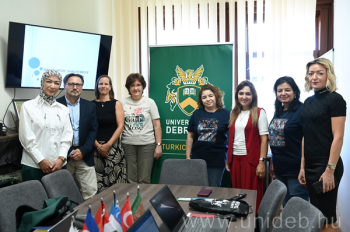
What Is DExam and Why It Matters for Uzbek Educators
At the University of Debrecen, a flagship initiative in Hungary’s higher‑education landscape, the DExam framework has begun to reshape how language competence is measured for non‑native learners. DExam—short for “Dynamic Examination”—is a structured assessment protocol designed to capture proficiency across speaking, listening, reading, and writing in English. Its purpose is twofold: to provide a reliable, internationally‑recognised credential for teachers and to supply a pedagogical model that can be replicated in local teacher‑training contexts.
For Uzbek teachers joining the University’s exchange program, DExam offers an evidence‑based standard that aligns with global benchmarks. In a sector where certification gaps can hamper career mobility or impede curriculum alignment, the DExam approach delivers both prestige and practical relevance. By participating in this training, Uzbek educators are not only diversifying their skill set but also gaining access to a toolkit that enhances their own students’ learning outcomes back home.
The Role of the TürkCorner Hub in Cross‑Cultural Exchange
The Turkish‑style “TürkCorner” venue, opened in December 2024 by the Faculty of Humanities, serves as a living showcase of Central Asian cultural heritage. Its proximity to the University of Debrecen places Uzbek delegates in a unique cultural exchange environment. Here, traditional music, art, and language‑practice workshops are integrated with the academic modules of the DExam program, with a focus on creating authentic, immersive learning moments.
Beyond its cultural allure, the hub functions as a logistical center for the DExam sessions, providing language resource libraries, peer‑learning circles, and dedicated assessment rooms. Its design facilitates interaction between Hungarian staff and Uzbek participants, allowing them to observe curricular differences and adapt best practices into their own national contexts.
Hands‑On Training: From Theory to Practice
Spanning the first two weeks of the exchange, the program offers split sessions: theoretical seminars on assessment theory—validity, reliability, and fairness—and practical workshops where teachers create, pilot, and critique sample DExam tasks. Staff from the Department of English Language Pedagogy and Methodology, led by Ildikó Csépes, and expert coordinators like Erzsébet Bölcskei design exercises that mirror real‑world classroom scenarios.
During these workshops, delegates learn to administer timed speaking tests, interpret listening metrics, and use diagnostic rubrics for written production. Importantly, the training includes a feedback loop: teachers submit their own assessment items, receive peer review, and revise strategies based on collected data. This iterative process ensures that participants leave with a tangible collection of materials adapted for their local contexts.
Schedule a free consultation to learn how to implement DExam in your institution
Impact on Teacher Development in Uzbekistan
Representatives from the Tashkent Institute of Irrigation and Agricultural Mechanization Engineers and the National University of Uzbekistan reported that the DExam training has immediate effects on both reflective practice and curriculum design. Their feedback points to key benefits: 1) a sharper understanding of assessment criteria that can be directly translated into national teacher‑certification processes, and 2) a framework for continuous professional development (CPD) that can be scaled across provinces.
The exchange has also fostered ongoing communication channels. Delegates are encouraged to contribute to a shared digital repository of DExam resources, which will be made available under the University of Debrecen’s open‑access policy. This collaborative network extends to neighboring Central Asian partners, including Azerbaijan, Kazakhstan, Kyrgyzstan, Turkey, and Turkmenistan, allowing for comparative studies and shared progression.
By embedding language assessment within broader pedagogical objectives, Uzbek teachers are now better equipped to monitor student progress, provide targeted interventions, and align curriculum with international standards—all without extensive resource over‑reach.
Future Collaboration Prospects
The University of Debrecen’s leadership, as noted by Head of Coordination and Strategy, Okszana Kiszil, sees this training as a catalyst for deeper ties. Prospective offerings include diploma courses in assessment design, joint research grants, and semester‑long scholar exchange programs that broaden both faculty and student exposure. Moreover, the success of this initiative is expected to lead to more intensive collaboration with other Central Asian institutions, ensuring that the DExam model evolves with local educational policies.
Stakeholders can anticipate regular workshops, a summer workshop series, and an annual assessment competition that invites Uzbek schools to showcase the impact of DExam‑based instruction. Such events reinforce shared commitment to quality teaching and foster a sustainable learning ecosystem.
To stay informed about forthcoming opportunities, consider subscribing to the University of Debrecen’s professional learning newsletters.
Take the Next Step
From the University of Debrecen’s perspective, the partnership is a two‑way gateway. Uzbekistan gains immediate instructional resources, while the University gains a foothold in Central Asia’s evolving educational landscape. For Uzbek teachers, the DExam training is a tangible step forward—providing tools, knowledge, and a network that will shape language instruction for years to come.
To apply for the next cohort or to schedule an informational session with the Faculty of Humanities, please contact us today. Uzbekistan’s future classroom experiences can be enriched by this proven assessment methodology, reinforcing the region’s global language competency.
Should you require further clarification on DExam modules or wish to explore how this framework could support your institution’s teacher‑training objectives, feel free to reach out. Let the University of Debrecen help pave the way for high‑quality language assessment and teacher development across the region.

